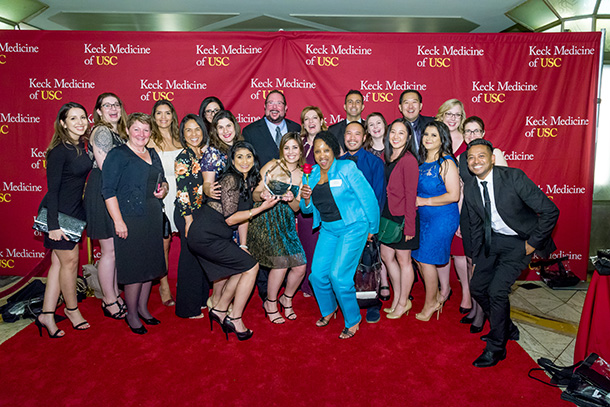USC-VHH Emergency Department wins Choi Award with commitment to patient care
Compassion, efficiency and clinical expertise are at the core of the USC Verdugo Hills Hospital Department of Emergency Medicine’s commitment to deliver exceptional care to residents of the Foothills communities.
The department was selected as the team award winner of the Choi Family Awards for Excellence in Patient-Centered Care, which honors exceptional physicians, nurses and staff who hold an unwavering commitment to compassionate patient care.
With a team of 12 physicians, seven nurse practitioners, 42 nurses and a supporting staff, the USC Verdugo Hills Hospital Department of Emergency Medicine provides care to about 75-90 patients a day. Nearly 25,000 patients are served each year.
“Our patient volume is continually rising,” said Jessica Thomas, the department’s clinical director. “Part of that is the nature of health care, and part is due to word on the street — patients are having a good experience here, and they’re telling others.”
Despite an increase in patient volume, average door-to-provider time is less than 30 minutes, and overall wait times are significantly lower than the national average.
The commitment to providing efficient, compassionate care comes as department leaders look to create a winning workplace culture by focusing on soliciting feedback from physicians, nurses and staff to create a positive, friendly work environment, said Department Medical Director David A. Tashman, MD, associate professor of clinical emergency medicine at the Keck School of Medicine of USC.
“When you have a happy and satisfied workforce, that translates down to the patient,” Tashman said. “We’re always looking at what can we do to give our providers the ability to deliver the best care so they can give our patients their full attention.”
To further enhance the patient experience, the department has implemented patient ambassadors to help patients navigate their health care journey.
“When patients are in the ER they are typically scared,” Thomas said. “Our ambassadors eliminate that fear factor and help patients communicate with physicians, nurses and staff. They help our patients know what they’re waiting for and what they can expect.”
The department is consistently looking for ways to improve, including reviewing and learning from comments and feedback from patients.
“We take a close look at everything we do — when things go well and when they don’t go well,” Thomas said. “Our patients say they have noticed a positive difference and that’s a result of our targeted efforts. It’s those positive comments from our patients that are the most rewarding for us.” —Douglas Morino


